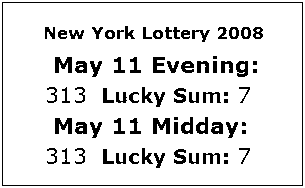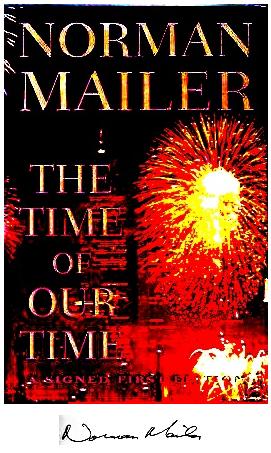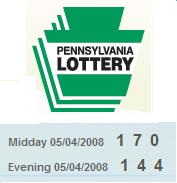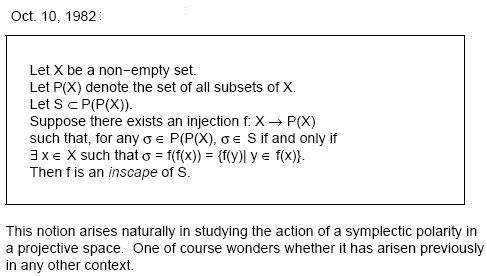From the journal of Steven H. Cullinane...
2008 May 01-15
Tuesday, May 13, 2008 11:00 AM
Context-Sensitive Theology, continued:
Only the Dead
Know Brooklyn
(
continued
from April 2004)
David Brooks in
today's New York Times:
"The mind seems to have
the ability to transcend itself
and merge with a larger
presence that feels more real."
Sometimes in rather strange ways... An example--
|
Monday, Feb. 10, 2003
Singing-Masters
Come from the
holy fire, perne in a gyre,
And be the singing-masters of my soul.
— William Butler Yeats
|

Durante
|

Shari Lewis
|
|
Last Sunday night (May 11),
Turner Classic Movies
showed a film featuring
Jimmy Durante as a
singing-master of
Frank Sinatra:

From earlier this month,
an entry featuring Sinatra and a
different singing-master -- not from
Brooklyn but from Tidioute --
Monday, May 12, 2008 12:00 AM
Time and Chance, continued:
Sunday's New York
lottery numbers:

See also 3/13, 2006.
Sunday, May 11, 2008 10:31 AM
Annals of Poetry:
May and Zan

May Swenson (left)
and Zan Knudson (right)
In memory of poet May Swenson and sports novelist Rozanne Ruth "Zan" Knudson:
Maureen Dowd in today's New York Times:
"It's a similar syndrome to the one Katharine Hepburn's
star athlete and her supercilious fiancé have in 'Pat and Mike.'
The fiancé is always belittling Hepburn, so whenever he's
in the stands, her tennis and golf go kerflooey. Finally, her manager,
played by Spencer Tracy, asks the fiancé to stay away from big
matches, explaining, 'You are the wrong jockey for this chick.'
'You know, except when you're around, we got a very valuable piece of property here,' he says,
later adding, 'When you're around, she's no good, she's dead, see?'"

Summary of M. A. Foster's
The Gameplayers of Zan:
"Then she has a vision of herself,
enclosed by an
unfolded hypercube,
and then an immense screen
behind it covered by complex,
ever-shifting patterns...."
"Christ! What are
patterns for?"
"Does
the word 'tesseract'
mean anything to you?"
-- Robert A. Heinlein
Saturday, May 10, 2008 8:00 AM
ART WARS continued:
MoMA Goes to
Kindergarten
"... the startling thesis of Mr. Brosterman's new book, 'Inventing
Kindergarten' (Harry N. Abrams, $39.95): that everything the giants of
modern art and architecture knew about abstraction they learned in
kindergarten, thanks to building blocks and other educational toys
designed by Friedrich Froebel, a German educator, who coined the term
'kindergarten' in the 1830's."
-- "Was Modernism Born
in Toddler Toolboxes?"
by Trip Gabriel, New York Times,
April 10, 1997
RELATED MATERIAL
Figure 1 --
Concept from 1819:

(Footnotes 1 and 2)
Figure 2 --
The Third Gift, 1837:
 Froebel's Third Gift
Froebel's Third Gift
Froebel, the inventor of
kindergarten, worked as
an assistant to the
crystallographer Weiss
mentioned in Fig. 1.
(Footnote 3)
Figure 3 --
The Third Gift, 1906:
 Figure 4 --
Figure 4 --
Solomon's Cube,
1981
and 1983:

Figure 5 --
Design Cube, 2006:
For some mathematical background, see
Footnotes:
Friday, May 9, 2008 10:31 AM
Mathematics and Narrative, continued:
Friday, May 9, 2008 9:00 AM
ART WARS continued:
Thursday, May 8, 2008 4:48 PM
ART WARS continued:
Synchronicity,
Part Deux

From
"On the Holy Trinity,"
the entry in the 3:20 PM
French footprint:
"...while the scientist sees
everything that happens
in one point of space,
the poet feels
everything that happens
in one point of time...
all forming an
instantaneous and transparent
organism of events...."
-- Vladimir Nabokov
From
"Angel in the Details,"
the entry in the 3:59 PM
French footprint:
"I dwell in Possibility -
A fairer House than Prose"
-- Emily Dickinson
These, along with this afternoon's
earlier entry, suggest a review
of a third Log24 item,
Windmills,
with an actress from France as...
|
Changing
Woman:
"Kaleidoscope turning...
 
Shifting pattern
within unalterable structure..."
-- Roger Zelazny, Eye of Cat
|
"When life itself seems lunatic,
who knows where madness lies?"
-- For the source, see
Joyce's Nightmare Continues.
Thursday, May 8, 2008 1:00 PM
Annals of Religion, continued:
Synchronicity
Today is the
feast
of
Saint
Robert A. Heinlein.
Time of the above: 1:00 PM.
Update of 2:07 PM --
On the local
Charlie Rose broadcast today at about 1:48 PM, Paola
Antonelli, the organizer of an exhibit at
MoMA, "Design and the
Elastic Mind," talked about science fiction's influence (or
non-influence) on the exhibit. She used the metaphor "the day after
tomorrow." As I had just written a link relating design, science
fiction, and May 10 (the date of the
literal day after
tomorrow-- click on "feast" above), I found her remarks of interest.
Here is a related passage from
a web page.
Paola Antonelli
Photo Credit: Andrea Ciotti
Antonelli on scientists as designers who do not call themselves
designers:
"So they all try to reach out. They have that in common. Then what they
have in common is this attempt to... propose something for the real
future. I don't really like science fiction, but I like to think of
tomorrow and the day after tomorrow."
Amen.
Thursday, May 8, 2008 12:00 PM
Annals of Religion:
Star Wars
"JERUSALEM, May 7 (Reuters) -
Fireworks and military fanfare
launched Israel's 60th anniversary
celebrations on Wednesday..."
Related material
from Tuesday:
 "... someone was down sixty,
"... someone was down sixty,
someone was up...."
-- Play It As It Lays
Wednesday, May 7, 2008 7:00 AM
Review:
Forms of the Rock
"point A / In a perspective
that begins again / At B"
-- Wallace Stevens,
The Rock
See also
August
2, 2002
January 20, 2003
April 8, 2003
December
5, 2004
December 10, 2004
January 11, 2006
April
30, 2006
August 25, 2006
August 26, 2006
February 6, 2007
July 23, 2007
July 24, 2007
September 30, 2007
April 14, 2008
Christmas
Eve, 1981
Tuesday, May 6, 2008 11:07 AM
Mailer's Wake:
In the Dreamtime
the Point Was Ten
From Play It As It Lays,
the paperback edition of 1990
(Farrar, Straus and Giroux) --
| Page 170:
"... In her half sleep
the
point was ten, the jackpot was on eighteen, the
only man that could ever reach her was the son of a
preacher man, someone was down sixty, someone was
up, Daddy wants a popper and she rode a
painted
pony let the spinning wheel spin.
By the end of a week she was thinking
constantly
about where her body stopped and the air began,
about the
exact point in space and time that was the
difference between Maria and other. She had the sense
that if she could get that in her mind and hold it for
170
even one micro-second she would have what
she had
come to get." |
For further details
see yesterday's entries.
"In her half sleep
the point was ten...."
--
Play It As It Lays
The
Random House

signed first edition
of Norman Mailer's
The Time of Our Time
(4 pounds, 1286 pages)
was published
ten years ago yesterday --
May 5, 1998:
Fireworks starburst
on the cover of
The Time of Our Time
 Also from May 5, 1998:
Also from May 5, 1998:
File Photo in Mailer's obituary --
(Photo by Bebeto Matthews
with Mailer obituary in
Toronto Globe and Mail)
with excerpt from the obituary,
by Richard Pyle
(Associated Press
Saturday, Nov. 10, 2007
at 8:20 AM EDT)

Related material:
Yesterday's entries and
the time of
this entry:
11:07:51 AM ET

 51
51
THE JUDGMENT
SHOCK brings success.
Shock comes - oh, oh!
Laughing words - ha, ha!
in light of...
A: Mailer's fireworks starburst
on his book cover from
ten years ago yesterday
B: A real starburst in a story
from ten years ago today. |
Monday, May 5, 2008 11:07 PM
Short Story:
Time and the River
"At the edge of
the meadow
flowed the river.
Nick was glad
to get to the river.
He walked upstream
through the meadow."
--
Ernest Hemingway
Pennsylvania Lottery
May 5, 2008:

Related material:
2/16, 7/25
"In the swamp the banks were bare, the big cedars came together
overhead, the sun did not come through, except in patches; in the fast
deep water, in the half light, the fishing would be tragic. In the
swamp fishing was a tragic adventure. Nick did not want it. He did not
want to go down the stream any further today."
Monday, May 5, 2008 9:00 PM
Annals of Fear and Loathing:
"All our words from loose using
have lost their edge."
-- Ernest Hemingway
Look Homeward, Norman
New York Lottery
May 5, 2008:

The evening number,
411, may be interpreted
as 4/11. From Log24
on that date:
As for the mid-day number
098, a Google search
(with the aid of, in retrospect,
the above family tribute)
on "98 'Norman Mailer'"
yields
From an unattributed
"editorial review" of
The Time of Our Time
at Amazon.com:
"Surely this sense of himself
as the republic's recording angel
accounts for the structure
of Mailer's anthology...."
Related material:
From Play It As It Lays,
the paperback edition of 1990
(Farrar, Straus and Giroux) --
| Page 170:
"... In her half sleep
the point was ten, the jackpot was on eighteen, the
only man that could ever reach her was the son of a
preacher man, someone was down sixty, someone was
up, Daddy wants a popper and she rode a
painted
pony let the spinning wheel spin.
By the end of a week she was thinking
constantly
about where her body stopped and the air began,
about the
exact point in space and time that was the
difference between Maria and other. She had the sense
that if she could get that in her mind and hold it for
170
even one micro-second she would have what
she had
come to get." |
The number 411 from
this evening's New York Lottery
may thus be regarded as naming the
"exact point in space and time"
sought in the above passage.
For a related midrash
on the meaning of the
passage's page number,
see the previous entry.
For a more plausible
recording angel,
see Sinatra's birthday,
December
12, 2002.
Monday, May 5, 2008 11:07 AM
Mathematics and Narrative, continued:
Lottery Sermon
"And take upon's
the mystery of things
as if we were God's spies"
-- King Lear

From Log24 on
Aug. 19, 2003
and on
Ash
Wednesday, 2004:
a reviewer on
An Instance of the Fingerpost::
"Perhaps we are meant to
see the story as a cubist
retelling of the crucifixion."
From Log24 on
Michaelmas
2007:

Google searches suggested by
Sunday's PA lottery numbers
(mid-day 170, evening 144)
and by the above
figure of Kate Beckinsale
pointing to an instance of
the number 144 --
Click to enlarge:
 Related material:
Related material:
Beckinsale in another film
(See
At the Crossroads,
Log24, Dec. 8, 2006):
"For every kind of vampire,
-- Gravity's Rainbow
There is such a thing
as a tesseract.
"It was only in retrospect
that the silliness
became
profound."
-- Review of
Faust in Copenhagen
From the conclusion of
Joan Didion's 1970 novel
Play It As It Lays --

"I know what 'nothing' means,
and keep on playing."
From Play It As It Lays,
the paperback edition of 1990
(Farrar, Straus and Giroux) --
| Page 170:
"By the end of a week she was thinking
constantly
about where
her body stopped and the air began,
about the exact point in space and time that was the
difference between Maria and other. She had the sense
that if she could get that in her mind and hold it for
170
even one micro-second she would have what
she had
come to get." |
"The page
numbers
are generally reliable."
--
Michaelmas 2007
Sunday, May 4, 2008 10:12 AM
A Diploma for Frank from...
Saturday, May 3, 2008 11:07 PM
Annals of Theology, continued:
"Teach us to
number our days."
--
Psalm 90, verse 12
"At any time, God can cancel a life. 'So teach us to
number our days,' as the King James Version has it, 'that we may apply
our hearts unto wisdom.'....
The ancient Hebrew word for the shadowy underworld where the dead go, Sheol,
was Christianized as 'Hell,' even though there is no such concept in
the Hebrew Bible. Alter prefers the words 'victory' and 'rescue' as
translations of yeshu'ah, and eschews the Christian version,
which is the heavily loaded 'salvation.' And so on. Stripping his
English of these artificial cleansers, Alter takes us back to the
essence of the meaning. Suddenly, in a world without Heaven, Hell, the
soul, and eternal salvation or redemption, the theological stakes seem
more local and temporal: 'So teach us to number our days.'"
Today's numbers from the
Pennsylvania Lottery:

which, being interpreted,
is
5/10 and
7/24.
Selah.
Friday, May 2, 2008 12:00 PM
Mr. Holland's Week, continued:
A Balliol Star
In memory of
mathematician
Graham Higman of
Balliol College and
Magdalen College,
Oxford,
Jan. 19, 1917 -
April 8, 2008
From
a biography of an earlier Balliol student, Gerard
Manley Hopkins (1844-1889):
"In 1867 he won First-Class degrees in Classics and 'Greats' (a rare
'double-first') and was considered by
Jowett
to be the star of Balliol."
Hopkins, a poet who coined the term "
inscape," was a member of the Society of Jesus.
From a publication of that society,
The Invariant,
Issue 15-- undated but (according to Issue 16, of 2005) from 1996 (
pdf):
|
Taking the square root
of a function
by Ian Collier
"David Singmaster once gave a talk at the Invariants and afterwards
asked this question:
What is the square root of the exponential function? In other words,
can you define a function f such that for all x, f
2(x) -- that is, f ( f
(x)) -- is equal to e x
? He did not give the answer straight away so I attempted it...." |
Another approach to the expression f(f(x)), by myself
in
1982:

For further details,
see
Inscapes.
For more about Higman, see an interview in the September 2001
newsletter of the European Mathematical Society (
pdf).
"Philosophers ponder the idea
of identity: what it is to give
something a name
on Monday
and have it respond to
that name on Friday...."
--
Bernard Holland
Thursday, May 1, 2008 12:00 PM
For the First of May:
Back from
the Shadows

|
"I sat upon
the shore |
|
Fishing, with the arid plain behind me"
-- The
Waste Land, lines 423-424
Eliot's note on line 424 --
"V. Weston, From Ritual to Romance;
chapter on the Fisher King."
|
"So far as the present state of our knowledge goes we can affirm with
certainty that the Fish is a Life symbol of immemorial antiquity, and
the title of Fisher has, from the earliest ages, been associated with
Deities who were held to be specially connected with the origin and
preservation of Life."
Weston quotes a writer she does not name* who says that "the Fish was
sacred to those deities who were supposed to lead men back from the
shadows of death to life."
* The Open Court, June and July 1911, p. 168 |
Today's Doonesbury
(a flashback) --

"Some days it went so well that you could make the country so that you
could walk into it through the timber to come out into the clearing and
work up onto the high ground and see the hills beyond the arm of the
lake."
-- Ernest Hemingway,
A Moveable Feast







































